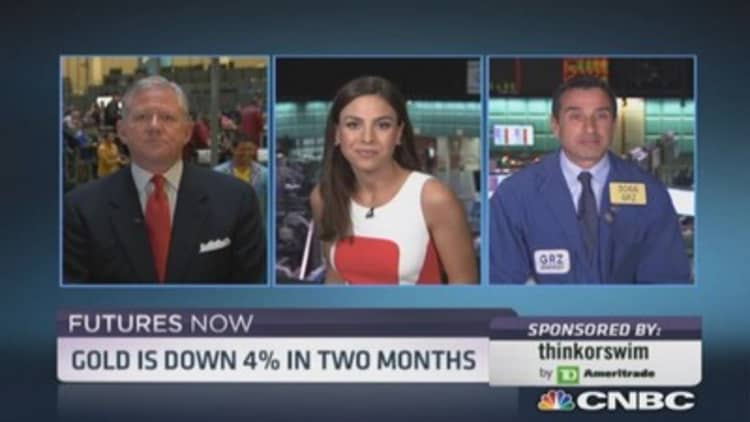
Whenever a geopolitical crisis rears its head—such as the one slowly unfolding between Russia and Ukraine—Wall Street can be quick to tie gold's daily moves to any belligerent or peaceful headlines.
Many turn to bullion in times of turmoil, viewing gold as a safe haven asset that rises when situations gets scary.
But according to gold experts, that betrays a basic misunderstanding of how the gold market works.
"I don't think the geopoliticals are doing anything for gold. And the only time they do is if they destabilize the equity market," said Edward Meir, senior commodity consultant with INTL FCStone.
Read MoreWhy Goldman's gold man recommends shorting gold
In other words, gold may indeed rise when scary situations crop up around the globe, but gold prices are responding to the action in the equity market, not to the conflicts themselves.
That comports with recent market movements.
Despite the Ukraine crisis, which continues to be dicey and somewhat murky, gold prices are trading just off of a 2½-month low, as stocks continue to set record highs.
And despite belligerent-sounding headlines, with Russian President Vladimir Putin reportedly saying he could "take (Ukraine capital) Kiev in two weeks," gold prices dropped 1.7 percent that day.
"It's doesn't respond directly—gold kind of responds afterwards," agreed RBC precious metals analyst George Gero. While noting that gold traders are closely watching the situations in Ukraine and in the Middle East, Gero said that it's "strong stocks and a strong dollar" that have hurt gold recently.
Read MoreGold ends higher on heightened tensions over Ukraine
Another aspect of the trade that many have been missing is that investors around the world have a less volatile safe-haven asset they can turn to: the U.S. dollar.
"We tend to buy gold when faced with geopolitical problems, but outside the U.S., they tend to buy dollars in the face of such turmoil," said Scott Nations of NationsShares.
Indeed, the U.S. Dollar Index, which compares the dollar to a basket of other currencies that most prominently includes the euro, has surged over the past few months, and a stronger dollar tends to hurt gold.
In fact, a major rationale for buying gold over the past few years has been that Federal Reserve action would lead inflation to take off, and gold ownership would provide protection. But so far, rumors of the dollar's demise, like those of Mark Twain's, have proven to be greatly exaggerated. And partly as a result, gold prices have unraveled, losing a third of their value since peaking three years ago.
Read More As US dollar soars, commodities get crushed
Given the macro outlook, "there's not much reason for Americans to be buying gold, and plenty of reasons for us to be selling," Nations said.
Meir, too, sees few reasons for the gold trade to turn around.
"Short term, we can test lows at $1,240," or some 2 percent below current levels, he told CNBC.com. "And at this rate, I think you're looking at numbers below $1,200 later this year and into 2015."
Jeffrey Currie, head of commodities research at Goldman Sachs, told CNBC on Thursday he sees the precious metal falling 17 percent from current levels by year end.
But not everyone is so bearish.
"I think we hold around $1,250, and I think we're going to see some bargain-hunting," Gero said. "People are getting interested. I've gotten some calls today, asking: 'Do you think it's time to come back in somewhat under $1,300?' But I tell them, 'Not yet.' No one wants to be the first."
—By CNBC's Alex Rosenberg.
Watch "Futures Now" Tuesdays & Thursdays 1 p.m. ET exclusively on FuturesNow.CNBC.com!



